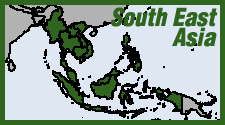 Despite a democratic opening and hopes for peace with the ethnic insurgencies in the northern hinterlands, horrific accounts of rights abuses continue to emerge from the multi-sided war over Burma's opium production. According to reports from village leaders, Burmese army troops on Jan. 19 tortured, raped and killed two young volunteer teachers. The women were both Kachin and Christians, so may have been targeted for ethnicity or religion. The attacks came when the village of Shabuk-Kaunghka, in Shan state's Mungbaw township, was occupied by a Light Infantry battalion that entered the area following clashes with the Kachin Independence Army (KIA). New fighting erupted after three police officers and a local highway administrator were detained by the KIA while carrying out a road inspection in the area. They were released after mediation, but clashes continue.
Despite a democratic opening and hopes for peace with the ethnic insurgencies in the northern hinterlands, horrific accounts of rights abuses continue to emerge from the multi-sided war over Burma's opium production. According to reports from village leaders, Burmese army troops on Jan. 19 tortured, raped and killed two young volunteer teachers. The women were both Kachin and Christians, so may have been targeted for ethnicity or religion. The attacks came when the village of Shabuk-Kaunghka, in Shan state's Mungbaw township, was occupied by a Light Infantry battalion that entered the area following clashes with the Kachin Independence Army (KIA). New fighting erupted after three police officers and a local highway administrator were detained by the KIA while carrying out a road inspection in the area. They were released after mediation, but clashes continue.
Authorities say they are investigating the killings at Shabuk-Kaunghka, but also accuse the KIA of attempting to sabotage peace efforts. Information Minister Ye Htut said the government wants to reach a peace deal with the Kachin rebels by Feb. 12, celebrated as the day that Kachin, Shan and Chin leaders signed the Panglong Agreement with independence hero Gen. Aung San in 1947, which brought their territories into the new Burmese state in return for guarantees of local autonomy. The last ceasefire with the KIA broke down in 2011, ironically just as Burma's much-touted democratic opening was beginning. With the regime wanting to get back into the good graces of the "international community," the long war has become an embarassment. The minister accused the KIA of "deliberate acts of provocation against the army with the intention to harm the peace negotiations."
As always, a struggle for control of the opium trade fuels the conflcit. On the Thai side of the border, where the Kachin can speak with greater freedom, the Kachin Women's Association of Thailand (KWAT) in October issued a report charging that Burma's military is allowing pro-government militias operating in Kachin and Shan states to grow opium in exchange for their support in the army's campaign against the KIA. KWAT says the rise in opium production has coincided with the renewed warfare since June 2011. The report, titled "Silent Offensive," claims that the paramilitary Border Guard Force (BGF) is heavily involved in opium production in eastern Kachin state's Chipwe, Sadung and Tsawlaw townships. The BGF fighters are themselves demobilized militants of the New Democratic Army-Kachin, a rival organization to the KIA that cut a deal with the government some 25 years ago.
The report charges the internally displaced persons (IDPs) forced to flee their villages by fighting are being exploited in the opium fields. Said one social worker interviewed at an IDP camp near the Chinese border: "After the war, the number of fields in mountain areas under the NDA-K (now Border Guard Forces) has increased greatly. They easily get workers and also pay them very little. People from the camp are now working in the opium fields."
The NDA-K's founder and longtime chief Zahkung Ting Ying (also rendered Za Khun Ting Ring) now serves as a member of Burma's national parliament representing an area where (the KWAT charges) he still rules as a warlord. His zone of control is officially designated "Special Region No 1," recognized by the then-dictatorship as part of the deal with the NDA-K. His political machine is said to profit from illegal timber felling as well as opium, escaping government crackdowns. BGF units have repeatedly seen fighting with the KIA over the past two years. (AP via Irrawaddy, Jan. 23; Kachin News, Democratic Voice of Burma, Asia News, Karen News, Jan. 21; Mizzima, Jan. 20; Kachin News, Oct. 8)
Cross-post to High Times







Recent comments
6 weeks 4 days ago
10 weeks 4 days ago
11 weeks 5 days ago
11 weeks 5 days ago
32 weeks 5 days ago
36 weeks 6 days ago
38 weeks 3 days ago
38 weeks 4 days ago
50 weeks 6 days ago
1 year 4 weeks ago